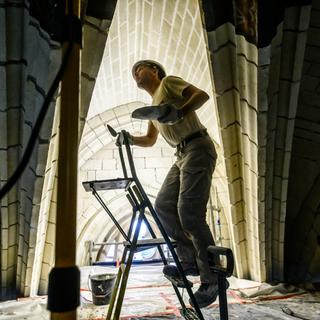


Lack of funding puts the preservation of France's historic monuments at risk
InvestigationConcentrating on just a few major projects, the French government is unable to cope with the huge investment required to maintain thousands of sites owned by small communities and individual owners. Private funding is struggling to pick up the slack.
The chief architect of historic monuments in charge of the Isère region, near Lyon, has his work cut out for him. Since the beginning of the year, Riccardo Giordano has been visiting the Grande Chartreuse every month. The state-owned monastery of the Carthusian order, founded in 1084, is currently undergoing an interminable renovation project involving part of the roof, the facades and some of the cells. Communication with the occupants is made difficult by their vow of silence. Few of the congregation's members are given the opportunity to talk to Giordano. "One of our main missions is to maintain the original function of the site. This always adds extra constraints to the renovation," said the architect.
As is the case for the Grande Chartreuse monastery, more than 46,000 historic monuments are "protected" by the state, due to their historical, artistic or technical interest. Among them are a majority of churches, castles, ramparts, washhouses, stadiums, artists' houses and landscaped parks, many of which will open their doors for free on the weekend of September 21 and 22, to mark the 41st European Heritage Days.
Tens of thousands of sites will remain closed to the public. The diagnosis is clear: Nearly a quarter of French monuments are considered to be in poor condition or at risk. The country is criss-crossed by 34,000 monuments "classified" by prefectoral decision. In addition, there are 14,200 "listed" by the Ministry of Culture. Maintenance, repair and restoration are mandatory for all of them. This represents a colossal undertaking, requiring a huge amount of expertise and funding, which the government is struggling to meet.
Bottomless pit
The importance of opening up these sites to visitors is no longer in doubt for the appeal of destination France, where 100 million visitors are expected in 2024. In June, a survey by Atout France, the national tourism development agency, revealed that 49% of foreigners discovered at least one cultural and heritage site during their stay. What's more, 33% of French people put discovering heritage at the top of their list of reasons for visiting during their summer vacations. Historic monuments therefore carry a lot of weight in the economic spin-offs generated by tourism, which is estimated at €63 billion for 2024.
Even in rural communities where tourists are scarce, monument preservation is an economic activity in its own right, and an "investment in the future," said the Fondation du Patrimoine. According to a study commissioned by the institution, the main private contributor to the financing of protected monuments, every euro invested in a project generates up to €21 in economic spin-offs. Heritage renovation employs local workers, feeds a network of professionals and preserves national know-how.
You have 73.31% of this article left to read. The rest is for subscribers only.


